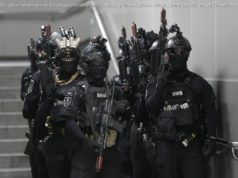Seoul officials assured us ‘the military exercises would go on as they need to’, the Heritage Foundation’s Bruce Klingner said
South Korean government officials have offered assurances that their joint military exercises with the US, which were pre-empted by the Winter Olympic Games, will proceed despite North Korea’s recent efforts to rebuild ties with Seoul by inviting President Moon Jae-in to Pyongyang.
“In the near term, the US will be wary about how far President Moon will go, but when I was in Seoul recently all of the officials assured us that the military exercises would go on as they need to,” said Bruce Klingner, the Washington-based Heritage Foundation’s Senior Fellow for Northeast Asia, who is also a former CIA officer.
“Then it’s the North’s decision as to whether they want to continue to play the charm offensive and try to wean away the South from the US, or do they take umbrage and use the military exercises as justification for what they’re going to do anyway, which is additional missile and nuclear tests?” Klingner said in a panel discussion at the New York-based Korea Society.
US President Donald Trump and Moon “agreed to de-conflict the Olympics and our military exercises so that United States and Republic of Korea forces can focus on ensuring the security of the Games”, the White House announced about a month before the international competition in Pyeongchang, South Korea, started.
North Korea’s Olympic charm offensive futile, says US
Analysts have called North Korea’s unprecedented diplomatic outreach to its estranged neighbour a transparent attempt to drive a wedge between Washington and Seoul, worrying some policymakers who see the US-South Korea alliance as an important foreign policy default.
North Korea’s leader, Kim Jong-un, this week offered praise for South Korea, which he said gave special priority to the North’s athletes at the Winter Olympics, according to a state media report. Kim called the South’s treatment of the North Korean visitors “very impressive”, the report said.
Those comments came after his younger sister, Kim Yo-jong, and other top regime officials returned from their trip to the Games. The younger Kim’s visit to South Korea was the first for a member of the North’s ruling dynasty.
North Korea says nuclear war inevitable because of military drills by US and South Korea
The decision pushed back the annual military exercises known as Foal Eagle, which are normally held between February and April to test the readiness of the two countries’ militaries.
The move contrasted with the hard-line rhetoric Trump had used against North Korea amid a series of intercontinental missile tests and nuclear detonations by Pyongyang in 2017.
North Korea routinely objects to the military exercises, calling them a rehearsal for an invasion by the US.
From 1996 to 2001, Klingner was the CIA’s deputy division chief for Korean affairs, responsible for the analysis of political, military, economic and leadership issues for the US president and other senior policymakers, according to the Heritage Foundation.
Can North Korea cover up its brutal regime with lipstick diplomacy?
Domestic politics, including protests by South Koreans against efforts to unite the North and South Korean Olympic teams, also point to the limitations of North Korea’s wedge strategy, some of the panellists said.
Moon has become more centrist and pragmatic on North Korea than he was before his election last year, said Su Mi Terry, who served as a senior North Korea analyst in the CIA under former President George W. Bush.
Moon’s change of strategy stands out in contrast to the style of his impeached predecessor, Park Geun-hye, who pursued a hard-line stance against Pyongyang.
That transition signals that the Seoul-Washington alliance is likely to withstand what some have called Pyongyang’s “charm offensive”, said Terry, who is Korea Chair and a senior fellow at the Washington-based Centre for Strategic & International Studies.
A date to remember: Moon and Kim Jong-un’s sister enjoy concert at climax of landmark peace visit
“Even if [Moon] has a summit with Kim Jong-un, I think it’s going to be hard to repeat the kind of dynamics of 2000 under former President Kim Dae-jung,” she said. “The Moon administration keeps saying that it learned from the Kim Dae-jung years.”
In 1998, then-South Korean President Kim announced the start of his “sunshine policy”, which signalled a more accommodating tone on North Korea as a way to reduce friction and antagonism between Pyongyang, Seoul and the US.
That policy has been seen as a failure, particularly as North Korea pursued its nuclear weapons programme in subsequent years.
“There’s a domestic constraint too,” Terry said. “It’s evident from the backlash over the Olympics, over walking under the united Korea flag and the unified female hockey team.”
Promise of unified Koreas at Olympics leads to anger in South Korea and concern internationally
The criticism of these gestures “didn’t only come from conservatives but also from many in the younger generation,” she said. “There’s only so much [Moon] can give in terms of unilateral concessions to North Korea.”






